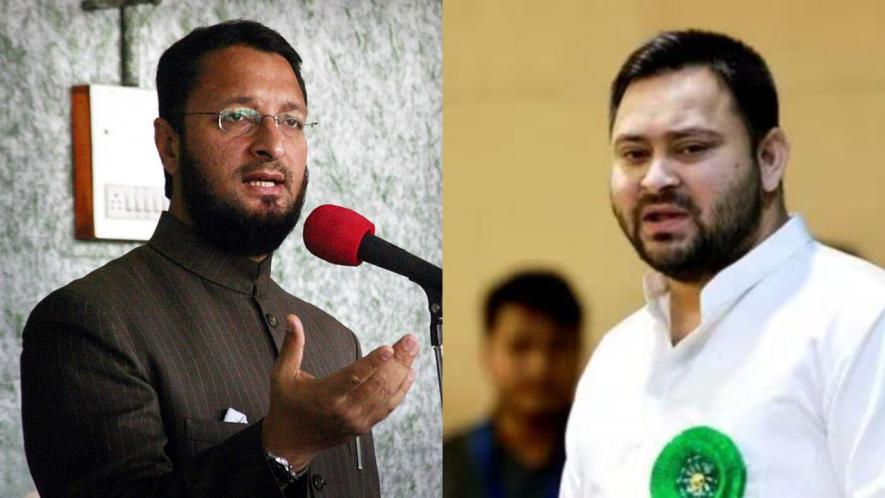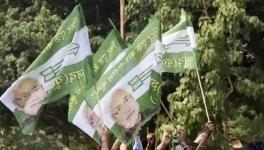Bihar Polls: Why Owaisi's Sway is Slipping in Seemanchal Amid MGB's Rise

Image Courtesy:Wikimedia Commons
The Bihar Assembly election campaign has reached its peak with voting on for the second and last phase on Tuesday, November 11. The first phase of polling was held on November 6. This second phase, with 122 seats in the fray, will seal the fate of all political aspirants. A key party to watch in this round is Asaduddin Owaisi’s AIMIM or All India Majlis-e-Ittehadul Muslimeen, whose performance is crucial to the political arithmetic.
The AIMIM had its most successful performance outside of old Hyderabad in the 2020 Assembly elections. Owaisi's party secured five seats, including Amour, Bahadurganj, Baisi, Jokihat, and Kochadhaman, and performed strongly in many others, finishing as a runner-up or on third-place. This came as a surprise to many who had previously taken the Seemanchal voters for granted and were banking on those seats to form a government.
Since 2020, the situation for AIMIM in the state has dramatically changed. In 2022, their four MLAs defected to the Rashtriya Janata Dal (RJD). After the RJD came to power for 17 months, the leadership rewarded these defectors, with some even being elevated to ministerial positions, a political status they likely wouldn't have achieved within the AIMIM fold. This included Izhar Asfi, the former AIMIM MLA from Kochadhaman, who switched to the RJD two years ago.
The shift in perception among local voters is evident; they are increasingly prioritising parties capable of forming a government and leveraging State power to solve their problems. This pragmatic stance is proving to be a potent political weapon against the AIMIM campaign, to which the party currently lacks an effective rebuttal. The MGB (opposition Mahagathbandhan) is reinforcing this by framing a vote for AIMIM as 'wasted vote' that helps Bharatiya Janata Party (BJP), while AIMIM is painting RJD as 'poachers' who 'stole' the 2020 mandate.
The declaration of RJD leader Tejashwi Yadav as the MGB’s chief ministerial candidate, coupled with Vikassheel Insaan Party’s Mukesh Sahani's potential deputy chief minister role, has ignited significant discussion among Bihar's electorate. This debate is not only prominent among MGB supporters but is also surprisingly and enthusiastically engaging BJP leaders and their sympathisers.
The AIMIM viewed this situation as a potential path for a political resurgence, as the party had been struggling to gain momentum with none of its political narratives resonating. They began an aggressive campaign against MGB leaders, relentlessly framing them as having betrayed Muslim aspirations. Arguments centered around the need for a strong surge in Muslim vote share and the demand for a Muslim deputy chief minister began to regain traction.
Owaisi’s key soundbite became a powerful challenge: "If a Malla's son (Mukesh Sahani) can become deputy CM with 3% of the population, what about the 17% minority community? Are they only here to spread 'dari' (carpets)?" This shift undoubtedly challenged the MGB's strategy, forcing their leaders to confront the same difficult questions repeatedly whenever they faced the media.
The counter-surge was settled suddenly by a shift in tone. MGB leaders, approaching the cameras with a newfound calm, announced that the state would surely have more than one Deputy CM, including a Muslim. To bolster this, Tejashwi Yadav has made a strong twofold pitch to Seemanchal, promising development via a "Seemanchal Development Authority" and a university, while also appealing to identity by pledging to "throw the Waqf (Amendment) Act into the dustbin."
Following one of their public rallies, Owaisi appeared somewhat rushed in claiming that they would not be satisfied with merely a Muslim Deputy CM. Instead, they would fight to make a Muslim from Seemanchal the chief minister of Bihar. However, this particular political contest seems to have been decided, and it clearly isn't favouring AIMIM. The public is currently demanding jobs and solutions to halt the migration of labourers—issues that AIMIM is not in a position to address or offer solutions for.
This time, the Mahagathbandhan appears well-prepared. It seems secular parties have significantly invested in strategies to prevent their voters from shifting allegiance to Owaisi. Their campaign approach is notably tactical, avoiding hate or negativity. A clear example is the campaigning of Iqra Hassan, the Samajwadi Party (SP) MP from Uttar Pradesh, for RJD and Congress candidates. Her statement, "He [Owaisi] is also one of us, but we only want to say that you should vote for the one who can form the government," reveals a subtle 'soft corner' for Owaisi while simultaneously making a very smart, strategic move to consolidate the anti-National Democratic Alliance vote.
Complementing this strategy, Imran Pratapgarhi, a prominent Muslim leader in the Congress party, is also enjoying immense popularity in the state, making him one of the most sought-after star campaigners, second only to Tejashwi Yadav.
While campaigning for Mehboob Alam, a senior MLA from the CPI(ML), Pratapgarhi publicly suggested that the public should be clear, stating with sincerity that Alam could also be made the Deputy CM from the MGB. This declaration, and the subsequent developments, appear to have significantly strengthened the consolidation of Muslim voters in favour of MGB.
The upcoming election in Bihar is shaping up to be a critical struggle for survival for the AIMIM, particularly as their most popular state leader, state president Akhtarul Iman, is also facing a tough fight defending his Amour seat. Compounding this challenge are local factors such as controversial ticket distribution, last-minute rebellions, a lack of a strong cadre base, and weak organisational structure.
Another factor adding to this erosion is that AIMIM is no more seen as a party of poor Muslims, as open statements from party leaders suggest only those who can pay for the expenses of the elections will be eligible for party tickets. This statement has not gone down well and is surely working against the party's prospects.
Looking at the seats AIMIM won in 2020, Jokihat seems to be slipping from their hands for sure. The 2020 winner, Shahnawaz, is now contesting from RJD, his brother Sarfaraz is also in the race, and the BJP/Janata Dal-United have their voter base intact, leaving little room for the AIMIM candidate.
In Thakurganj, the former JD-U contestant is now contesting on an RJD ticket and appears strong. In Kishanganj, where AIMIM was a close runner-up in 2020, MGB is making a strong case for consolidation to prevent BJP from winning. In short, the party does not appear to be in a strong position on the very seats it won last time.
The most significant factor remains the question of what the AIMIM can offer post-election. With only 29 seats contested, they lack a clear answer, and this weakness is eroding their voter base.
Reports suggest that the Mahagathbandhan can come out successful in its efforts to prevent the division of Muslim votes. They have demonstrated that secular parties are supported by some of the country's strongest Muslim voices and enjoy a significant following, including figures like Imran Pratapgarhi, Iqra Hassan, Imran Masood, Afzaal Ansari, and Osama Shahab. Furthermore, MGB has offered assurances that they are capable of effectively addressing the aspirations of the Muslim community in the state.
The election results, once declared after November 14th, will undoubtedly establish new parameters for the political landscape and prompt participants to explore alternative strategies for the game.
Zeeshan Akhtar Quasmi, is an independent journalist from Bihar and a student at Jamia Millia Islamia, Delhi. The views are personal.
Get the latest reports & analysis with people's perspective on Protests, movements & deep analytical videos, discussions of the current affairs in your Telegram app. Subscribe to NewsClick's Telegram channel & get Real-Time updates on stories, as they get published on our website.
























